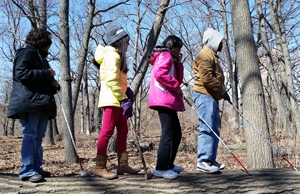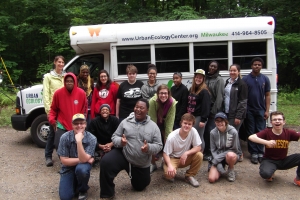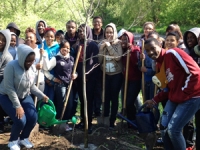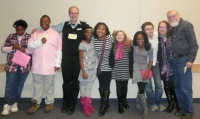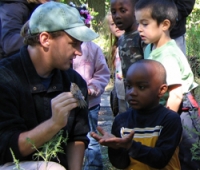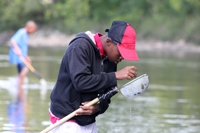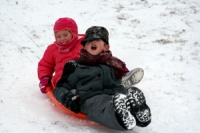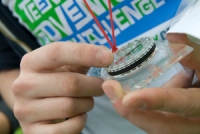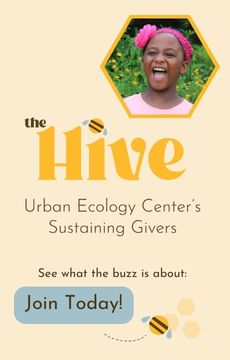
“Seeing” Nature
I was asked recently, “What is your philosophy of education?” This is a question I’ve explored many times throughout my years as an educator. Depending on the crowd, my answer brought warm smiles or a furrowed brow as some consider my philosophy a bit “dreamy” in this data-driven, standards-based era of education.
To me, a meaningful education is a journey of discovery, exploring the mystery and the magic of the world around us and within us. I had the joy of witnessing this outward and inward journey recently while observing two of our talented environmental educators in action.
Meet Our New Class of High School Outdoor Leaders!
Our 2014-2016 class of High School Outdoor Leaders have returned from an adventure in the Northwoods, finished their summer training, and are gearing up to start working with the Center as part of their paid two-year internship. Please join us in welcoming these 18 wonderful high school students that will become integral parts of the Urban Ecology Center community over the next two years.
Announcing the Arboretum Docent Program!
With the addition of 25 acres of land along the Milwaukee River and Oak Leaf Trail to the existing 15 acres of restored natural lands of Riverside Park, we are gearing up for adventures and exploration of our new 40-acre Milwaukee Rotary Centennial Arboretum. You are invited to join in the fun through our new volunteer docent program. This training will prepare you to lead other nature and outdoor enthusiasts in learning about the Arboretum.
An Exciting Year for the Washington Park Young Scientists!
It has been a huge year for the Young Scientists Club at Washington Park. Reflecting on it all, I can't even believe we've accomplished so much in such a short period of time! Longtime member Donald Harris did his best attempt to summarize exactly what we do in our club in a quote found later in this post. As I try to summarize it myself, I'm not even sure where to begin. What began as a way to engage drop-in kids at Washington Park has evolved into a dynamic, multi-faceted educational and recreational program that I'm proud to be a part of. I'll summarize for you a few of its many highlights over the past 12 months.
This past summer, we began a research partnership with the University of Minnesota's Driven to Discover program. The kids — with guidance from the staff — developed their own original bird research study and created a professional-quality research poster and paper. We then traveled to the University of Minnesota's insect fair, where we presented our research and won an Outstanding Project Award. Since then, our group of budding young scientists has also presented their work at our annual Community Science Research Summit, at the Wisconsin Bird Conservation Initiative annual conference, and to a group of partnering teachers at our schools. As I write this, Donald is again presenting our work for the Hi-Mount Elementary science fair!
Sustainable Solutions
Moments before 7am on a cold Tuesday morning, Jaimie Cloud, an education for sustainability expert from New York, and I dashed up the steps of Carmen High School. We were greeted by an enthusiastic math teacher and student and guided to the classroom. There, very professional looking students anxiously prepared to share their projects with us. These students spent the previous three weeks learning about sustainability: economic, ecological and equitable understandings of the world around them. They were charged with researching, analyzing and visualizing a project that improved the sustainability of their school.
Two Vignettes
Vignette # 1
“Urban Ecology Center, this is Dan” came a voice over the radio on Beth’s desk.
“Dan, this is Beth. Ken and I are meeting right now, how can I help you?"
“Sorry to bother you, but I’m in the bus awaiting the kids from Golda Meir. I’m teaching about the water cycle and I can’t remember exactly how many pennies I need for the third grade Water, Water Everywhere bus ride activity? Can you look it up for me?”
“No worries, hold on a second.” Sitting at her computer, Beth immediately got on our server, looked in the school program folder and quickly found the activity.
One Hundred Eighty Degrees at the Urban Ecology Center
"Uh uh. We ain’t going. We wanna go to gym!” What a way to start a class. We thought they’d be happy to see us. After all we were about to take them away from school to play and learn in the snow (and even slip in a little sledding). Who wouldn’t want to do that? This class, apparently. In fact, when we showed up at their room and asked if they were going on a field trip, they tried to convince us we were in the wrong room! Things did not start well, but we were confident that we could corral these seventh grade stallions.
It’s All About Magnetism
No matter how we dropped it on the cup of water, the needle kept pointing north. “Isn’t it awesome? Would you have imagined that we would be able to create a handmade compass by magnetizing a simple sewing needle?” I needed no other evaluation but the students’ amazed faces to realize that our class was pointing in the right direction, too.
Had I not learned about electricity and magnetism in a fun and interactive way as a child, I would not have been so successful with that class.
Starting Fresh
It is my first autumn as an educator with the Neighborhood Environmental Education Program at Washington Park, and I’m thrilled to be able to start a full year with my students. One of my first trips this school year was with a four-year-old kindergarten class from the MPS charter school Hawley Environmental.
Copyright © 2023 The Urban Ecology Center

